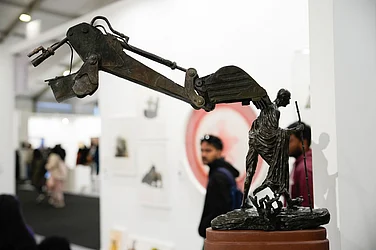Less than a year is left for the next Lok Sabha election. Many crucial states including Madhya Pradesh, Chhattisgarh, Rajasthan and Telangana will also hold Assembly polls this year. Expectedly, the (political) pitch is being prepared for the final. And right now, we are in the death overs of the semi-final that will set the tone for the finale in April-May next year.
Prime Minister Narendra Modi knows his game well. He has now made it abundantly clear that the next general election is going to be fought, among other issues, on the Uniform Civil Code. With the Ram Temple and Article 370 - two primary ideological issues for the Bharatiya Janata Party - already taken care of, the ruling party has now likely turned to UCC to seek a re-election.
"How can the country run with two rules," was the big question Modi asked Tuesday while addressing BJP workers in poll-bound Madhya Pradesh's Bhopal. “You tell me, can a family run if there is one law for one member and another for the others? Can it ever run?" he said in response to a question from a party worker. The worker had pointed out that attempts were being made to mislead on the matter of UCC after instant triple talaq among Muslims was made unconstitutional.
Modi, in his remarks, also stressed that the UCC has also been favoured by the Supreme Court and that the same finds mention in the Constitution as well.
A Uniform Civil Code, for the uninitiated, lays down a common set of rules and laws that govern marriage, divorce, succession and adoption for all citizens. A UCC takes precedence over all personal laws of different religions and faiths.
UCC and opposition unity
It is not the first time the BJP has advocated Uniform Civil Code in the country. However, it is probably the first time that such a strong pitch for the same has been made by the Prime Minister himself. And with general elections just months away, the signals are clear.
Something like this was also expected in view of the opposition parties coming together for the 2024 elections and agreeing to challenge Modi as one force. But whether the current dispensation will, for now, use UCC just as an election issue or will it bring a last-minute bill in Parliament is not clear. But for the UCC to become a law, time is not on the Modi government's side. Because the Opposition is going to oppose the move in Parliament.
Many opposition leaders vehemently opposed the code yesterday after Modi's remarks. Some called the raking up of the issue as a ploy to divert attention from a burning Manipur. Others like Congress's Bhupesh Baghel, also the chief minister of poll-bound Chhattisgarh, asked how will the UCC impact culture and traditions of tribals.
AIMIM chief Asaduddin Owaisi expressed fears that the UCC will snatch away the country’s pluralism and diversity.
Rashtriya Janata Dal's Manoj Jha asked the PM to first examine what the 21st Law Commission had said on UCC instead of making the issue an instrument of “dog-whistle politics”.
The 21st Law Commission, in a consultation paper issued on August 31, 2018, had suggested that UCC was “neither necessary nor desirable at this stage”. It had instead stated that amendments should be made to personal laws of various religions in order to prevent discrimination.
Muslim groups including the All India Muslim Personal Law Board and Jamiat Ulama-i-Hind also reacted to the PM's statement and said UCC was “not in keeping with the spirit of the Constitution that provides protection and freedom for all to practice their religion and customary laws".



























